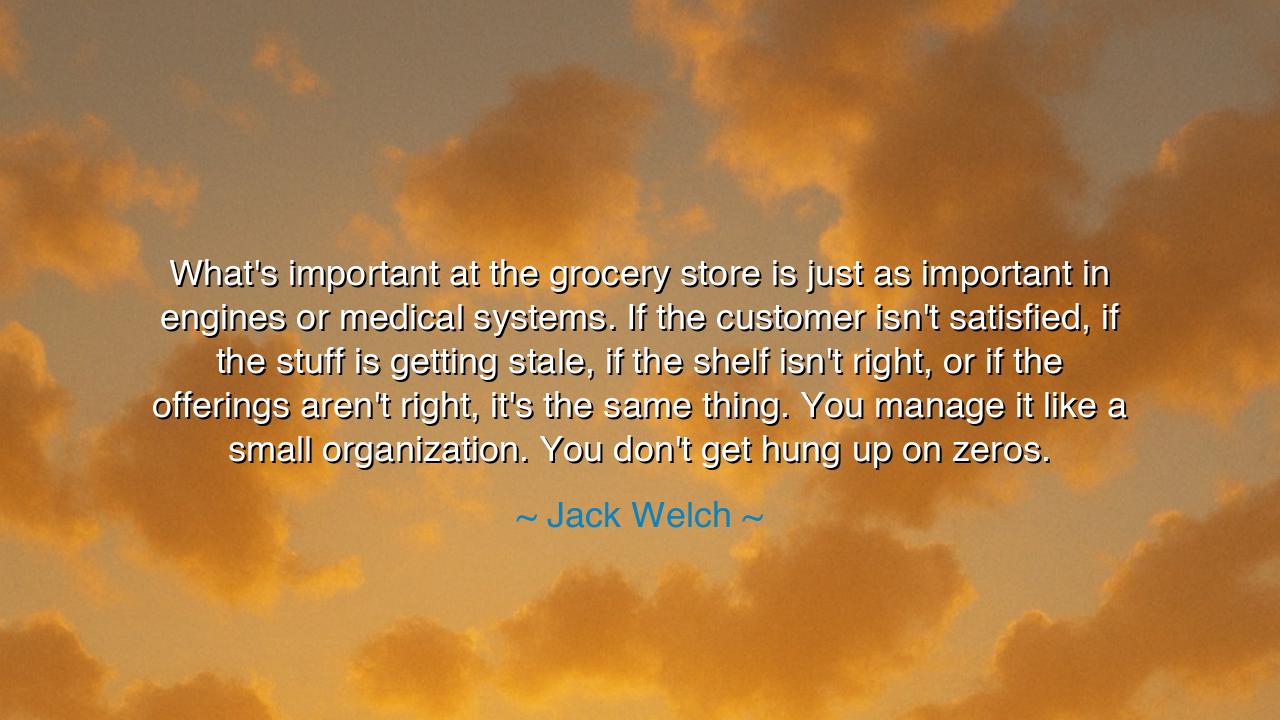
What's important at the grocery store is just as important in
What's important at the grocery store is just as important in engines or medical systems. If the customer isn't satisfied, if the stuff is getting stale, if the shelf isn't right, or if the offerings aren't right, it's the same thing. You manage it like a small organization. You don't get hung up on zeros.






In the words of Jack Welch, "What's important at the grocery store is just as important in engines or medical systems. If the customer isn't satisfied, if the stuff is getting stale, if the shelf isn't right, or if the offerings aren't right, it's the same thing. You manage it like a small organization. You don't get hung up on zeros." Welch's statement underscores a timeless principle: success, whether in business, medicine, or any other field, is determined by attention to detail, customer satisfaction, and the continuous pursuit of excellence. This idea, while rooted in modern management, echoes the wisdom of the ancients, who understood that true leadership and organization are built on the foundation of understanding the needs of those we serve.
The ancients often spoke of the balance required to maintain a thriving community, and this balance was found in the care taken with resources and the well-being of individuals. In Plato's Republic, he discusses how society must be carefully structured, with each part of the system working together in harmony to ensure that all needs are met. Just as a grocery store must provide fresh, quality goods for its customers to succeed, so too must every part of an organization or society work cohesively, with every individual’s needs and contributions acknowledged. Welch’s insight that the principles of management are universal—whether in a grocery store, a medical system, or an engine—reflects this ancient wisdom, where the goal of leadership is to ensure that every part of the system is running at its optimal level.
Consider the example of Alexander the Great, whose success as a leader was grounded not only in his military prowess but in his ability to understand the needs of his soldiers and the importance of maintaining strong and organized systems. Alexander knew that his army was like a finely tuned machine, and each component, from the soldier’s equipment to their morale, played a critical role in his campaign’s success. He understood that to keep the engine of war running smoothly, he had to pay attention to the smallest details, just as Welch advises—whether that meant ensuring provisions were plentiful, or that the soldiers were properly equipped. Alexander’s success lay in his ability to manage these parts as if they were all interconnected, each one essential to the greater whole.
In ancient Rome, Cicero spoke of the importance of diligence and attention to detail in leadership. He believed that a leader should always be aware of the needs of their people, ensuring that everything in their command was in good order. Cicero’s idea of managing a society was not unlike Welch’s approach to business: effective management required constant observation and adjustments, whether it was the needs of the citizens or the goods available for trade. In this sense, both Cicero and Welch share the understanding that leadership, in any form, requires continuous engagement with the tasks at hand, no matter how small they may seem.
In our modern world, Welch's emphasis on customer satisfaction and the effective management of resources is more relevant than ever. Whether in a grocery store or a medical system, the fundamental principle remains the same: success is built on understanding the needs of those we serve and ensuring that those needs are met with precision and care. The customer—whether a patient in a hospital, a consumer buying food, or a member of a community—deserves nothing less than our full attention and respect. This principle, if applied universally, can transform any organization into a thriving entity, just as Welch suggests.
The lesson we take from Welch’s words is one of vigilance and dedication. In every aspect of life—whether in our careers, personal relationships, or communities—we must learn to manage the smallest details, for it is in those details that true excellence lies. Let us not be overwhelmed by numbers or abstract goals, but focus instead on the immediate needs and the practical steps required to meet them. Just as Welch emphasized the importance of managing both quality and customer satisfaction, we too must approach every endeavor with the same care, ensuring that we are serving others with the utmost commitment to quality and attentiveness.
In our daily lives, we must apply Welch’s wisdom by paying attention to the details that make up the whole. Whether it’s in business, medicine, or even our personal relationships, we must engage with the tasks at hand, making sure that we are not just meeting the expectations of others, but exceeding them. We must learn that true success comes not from focusing solely on the big picture but from understanding the intricate systems that make up that picture and ensuring that each part is in its best form. By managing our lives like a small organization, we can ensure that we are living with purpose, attention, and integrity, just as the ancients taught us.






AAdministratorAdministrator
Welcome, honored guests. Please leave a comment, we will respond soon